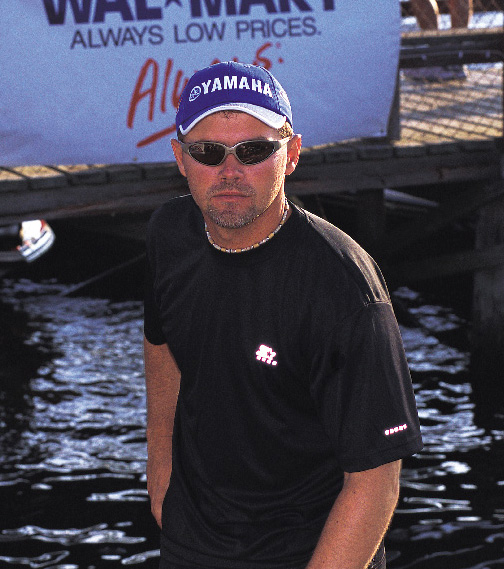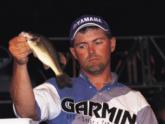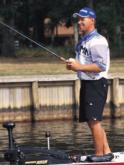Lefebre marches to beat of different drum

Casting for bass all day, playing bass guitar all night
During his initial year fishing FLW Outdoors tournaments, Dave Lefebre qualified for the 2001 EverStart Series Championship and finished ninth at Pickwick Lake. He also qualified for the 2002 Wal-Mart Bass Fishing League All-American by finishing fourth at the Chautauqua Lake Regional.
Some might say this is an impressive feat for a first-timer in two tournament series, but it didn’t surprise folks back home. For nearly a decade, Pennsylvania tournament fishermen had watched Lefebre walk away with top awards at bass competitions in his home state.
Anyone who spends time in the boat with Lefebre realizes he was born to fish. His casting skills and presentation techniques are impeccable. His sensory perception for detecting, or literally anticipating, a bite is phenomenal.
When Lefebre easily won his first local bass tournament in 1990, he set in motion a long list of high finishes over the coming years that left competitors with jaws hanging open. Initially his success was attributed to beginner’s luck, but competitors quickly realized Lefebre was a skilled technician. Everyone encouraged him to take his fishing to the next level by moving beyond state competitions. With the arrival of a new millennium, he was ready to make the move.
But even among fishing acquaintances back home, few knew much about Lefebre except his angling reputation. Keeping the nonfishing part of his life private was how he liked it.
“I have always fished,” Lefebre said. “Dad started taking me fishing when I was about 4. Dad fished for muskie in northwest Pennsylvania, but I recall my interest was always in bass – perhaps it was just too long a wait between strikes when muskie fishing. By 10, I started to take fishing seriously, first by collecting lures and then reading every fishing magazine available.”
 In his early teens, Lefebre began spending his entire summer vacation fishing on Lake LeBeouf, a small natural lake a few miles from his home.
In his early teens, Lefebre began spending his entire summer vacation fishing on Lake LeBeouf, a small natural lake a few miles from his home.
“Dad had a johnboat that he carried around in the bed of his pickup,” Lefebre said. “At 6:30 a.m. he would drop me off with the boat on his way to work. Then he would come back to pick me up about 4 p.m. on his way home. I was never ready to quit. That was my summer routine until I was old enough to drive. Of course, Mom and Dad expressed some concern about leaving me on the lake all day, but it kept me out of trouble.”
Lefebre’s parents considered their son’s interest in angling an acceptable pastime, but they never intended it to be a vocation. They believed their son’s talent lay elsewhere. In high school, Lefebre excelled in art, earning a scholarship to college. He turned it down – a disappointment to his parents that resulted in a rift not immediately reconciled. By the time he graduated from high school, Lefebre had two loves: music and bass fishing. His dream was to follow one or the other.
Music was a family affair. Lefebre started playing drums in a church band with his parents at 12. He certainly had a talent for instruments, mastering the bass guitar and keyboard in addition to drums. He learned early on that practice was the path to success in music. It was a lesson that has served him well in fishing, too.
“My parents instilled good work habits in me,” he said. “I always work hard at whatever I do and try to be the best. Music or fishing – I surround myself with people who are better than me. That’s one way I learn and improve my skills – by being challenged.”
After high school, Lefebre participated in several local bands before forming his own group. Known as 65 South, the band included a young female vocalist named Ann, who was destined to play a large role in Lefebre’s life.
Lefebre’s band typically had weekend engagements. After playing until the wee hours of the morning, he would leave for a tournament, fish all day, head back to play that night, then leave immediately for another tournament, arriving just in time for the takeoff. His rest on weekends was short naps while “chauffeur” Ann drove his vehicle.
 Within a couple of years, Lefebre was offered an audition with a professional band. Still intensively involved in regional tournaments, he accepted the job for nine months out of each year, reserving the summer months for fishing. For three years he toured throughout the east with Steel Justice, playing at night and fishing during the day on a different fishery every week.
Within a couple of years, Lefebre was offered an audition with a professional band. Still intensively involved in regional tournaments, he accepted the job for nine months out of each year, reserving the summer months for fishing. For three years he toured throughout the east with Steel Justice, playing at night and fishing during the day on a different fishery every week.
Although he never missed a performance as a result of his fishing addiction, there were some close calls. In Florida, for example, he was fishing 50 miles from the band’s performance site and accidentally dropped his car keys off a jetty into the ocean. On another Florida tour, Lefebre and Ann waded through a mangrove canal to an island during low tide and then could not make it back when the tide came in. They had to leave all their tackle, swim to shore, rush to the performance and come back the next day to collect their belongings.
At 30, with prompting from Ann, who was now his fiancee, Lefebre made a life-changing decision.
“I always had music and fishing. I knew I had to dedicate my life to one or the other, but not both,” he said. “The money in a professional band was good. I had other solid offers, too. But with music, I had to depend on people other than myself. You need at least five people for a band, and I discovered it was impossible to find five individuals with the same goals and same drive I had. A band is only as good as its weakest link. I decided to turn to fishing because success or failure boils down to just myself. That’s the way I like it.”
Next, Lefebre directed his efforts toward finding a boat and sufficient monetary support to see him through an entire fishing season. Things finally came together late in 2000. He resigned from Steel Justice and set out for a serious season on the tournament trail.
Few anglers work as hard as Lefebre in preparing for a competition. He believes practice is critical to success in a tournament, but in the same breath, he says too much time spent pre-fishing is a detriment.
“I consider myself a natural when it comes to fishing. I can pick up on what bass are doing rather quickly,” Lefebre said. “I really don’t need to practice on the water before a tournament as much as some people. If I have more than four days to pre-fish, that is too much. If you pre-fish too long, your fish will change. One guy I know plans for 30 days of practice before each tournament. I can’t see how that helps him. With four or maybe five practice days max, you are on top of what the fish are doing right then. Don’t cloud your mind with what happened 25 days ago. I want a clear vision of what bass are doing now.”
And speaking of clear vision, Lefebre says, his parents have finally seen the light.
“Once they saw my drive and determination in the last few years, they have come around,” he said. “Now they are 100 percent behind my decision to pursue a professional angling career.”
In particular, Lefebre wants to demonstrate a record of success on the tournament trail for his grandparents, with whom he lived for several years after high school.
“My goal is to make a name for myself in professional fishing so Granddad and Grandma Altimus know that I made it,” he said. “That’s important to me. I owe them so much because they supported me when other family members were less than enthused about my choices.”
Until success in the “big leagues” arrives, Lefebre will fish all levels of competition as time permits. He will continue his music, occasionally sitting in as a guest player with bands. Lefebre says failure is not an option for him in professional fishing. Nonetheless, it is prudent to have something to fall back on. After all, Lefebre must be prepared for all outcomes now that he is married to Ann.
When asked about his strong points in competitive fishing, Dave Lefebre of Erie, Pa., said he considers himself a “power” fisherman.
“I like to fish fast in order to cover water, using bait-casting equipment and heavy line to target aggressive fish,” he said. “If I had to pick one lure as my favorite, it would probably be a jig-and-pig. But I use crankbaits and spinner baits a lot, too.”
Where does he see himself in 10 years?
“Fishing competitively. I hope to be a household name in angling by then. But whether I am or not, I plan to keep on fishing until I’m 100 years old. At some point when I’m older, it will be necessary for me to move south to fish tournaments where the water is flatter so I don’t beat up my old body running on Lake Erie all the time.”
